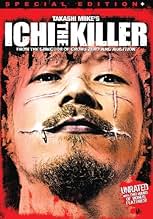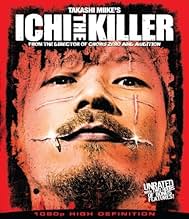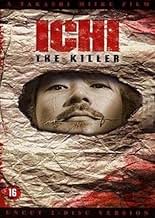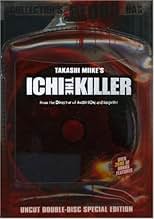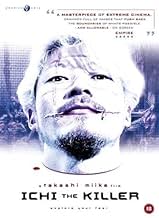VALUTAZIONE IMDb
7,0/10
61.248
LA TUA VALUTAZIONE
Mentre il sadomasochista yakuza Kakihara cerca il suo capo scomparso, incontra Ichi, un killer represso e psicotico che potrebbe essere in grado di infliggere livelli di dolore che Kakihara ... Leggi tuttoMentre il sadomasochista yakuza Kakihara cerca il suo capo scomparso, incontra Ichi, un killer represso e psicotico che potrebbe essere in grado di infliggere livelli di dolore che Kakihara ha solo sognato di raggiungere.Mentre il sadomasochista yakuza Kakihara cerca il suo capo scomparso, incontra Ichi, un killer represso e psicotico che potrebbe essere in grado di infliggere livelli di dolore che Kakihara ha solo sognato di raggiungere.
- Premi
- 6 vittorie e 4 candidature
Trama
Lo sapevi?
- Quiz(at around 18 mins) For the sequence based on the part in the manga during chapters 13-16 of volume 2, where a naked Susuki of the Funakigumi is tortured by being suspended from meat-hooks. Susuki's actor Susumu Terajima required twelve hours of makeup and other preparation, and then spent twelve more hours shooting the scene.
- Blooper(at around 1h 30 mins) When Kakihara is attacked in the streets, protective padding is visible under his clothing. Look for it when he bends over backwards without falling over, before he removes his piercings.
- Curiosità sui creditiEnd credits scroll up, down, left, right, forwards and backwards.
- Versioni alternativeThe French DVD is the full uncut version
- ConnessioniFeatured in The Cult of Ichi (2007)
Recensione in evidenza
Ichi the Killer is the story of a Yakuza gang run by Anjo, whom his underlings find missing (possibly killed) with 100 million yen gone as well. The functional head of Anjo's gang while he's absent is an off-the-wall sadomasochist named Kakihara (Tadanobu Asano). There is a former affiliate gang, now somewhat rivals, run by Fujiwara (Toru Tezuka), and there are a number of gang outcasts who hang out at a bar/brothel, with Jijii (Shinya Tsukamoto) as their head. Jijii is manipulating/grooming a bizarre killer named Ichi (Nao Omori), who is gradually taking out Anjo and Fujiwara gang members for him.
If you haven't seen infamous Japanese cult film director Takashi Miike's Ichi the Killer yet and you're considering it, there is one "test" that might make the decision easy for you--do you like fairly regular over-the-top violence, torture and gore? If that's enough to turn you on to a film, do not pass Ichi the Killer up--you're sure to love it. This is one of the most brutal and gory films I've seen, and yes, I've seen Andreas Schnaas films. However, if those things are enough to turn your stomach instead, you shouldn't come near this film with a two-foot needle.
For me, I don't mind over-the-top violence, torture and gore, but that in itself isn't sufficient for me to like a film. Despite some admirable stylistic flourishes, including some very unique cinematography and editing as well as an unusual but extremely effective soundtrack, there were a number of things in Ichi the Killer that didn't quite work for me. I ended up liking the film, but just moderately. A 7 is a "C" in my rating system.
One problem I had with the film, which might be clear from the description in my first paragraph, is that the plot isn't exactly easy to follow. Writer Sakichi Satô, adapting the script from a manga (Japanese comic) by Hideo Yamamoto, introduces a large number of characters in each scene, and we do not always get their names or very clear dialogue explaining who they are. There were quite a few characters for whom I was never very sure about their identity. In conjunction with this, the film didn't always flow as well as it should have. It tends to feel like long scenes of establishing exposition alternated with violence/torture showcases.
But by the final "act", there are some very interesting revelations about characters and their relationships to one another. So it's not that the kernel of a good story isn't there. It's just told a bit awkwardly. This might not have been helped by the fact that Miike has stated that he was shooting for a kind of open-ended vagueness that is characteristic of Asian genre films. The impact of the revelations is somewhat dissolved by the time we get to the dénouement due to the intentional ambiguity.
The beginning of Ichi the Killer employs a lot of extended cinematographic techniques in rapid succession ala Oliver Stone--different film speeds, stocks, tinting and processing methods, and so on. While these are interesting, Miike forgets about them quickly as he works his way into the story. They pop up occasionally later in the film, as do a couple shots in the vein of Dario Argento, such as a tracking shot through someone's ear. Even when more conventional, the cinematography and production design remain admirable throughout--I particularly liked the shot of Kakihara sitting in front of a red background, with his purple coat and green scarf, but there is a lot of outstanding visual composition in the film.
Whether intended or not, Ichi the Killer frequently reads as more of a black (morbid) comedy. This is because the violence is so over-the-top that it is frequently cartoonish and ridiculous. Those are positive qualities in my book, but anyone looking for realism should beware. On the other hand, the emotional reactions from "victims" are fairly realistic throughout the film, including the fact that people do not die immediately after they are injured.
But Miike's concern, as with his other films, is more surrealist. The behavior of the principal characters is particularly wacky, especially Ichi, who often seems borderline mentally deficient--he cries and cowers before he brutally attacks his victims, and has a very odd sexual dysfunction associated with his violence. Ichi is also portrayed as something akin to a superhero, and Miike constantly bounces back and forth between showing him as an admirable vigilante and an anti-hero. Kakihara, who is giving something of a venerable "bad boy" rock star/punk persona, is also almost a hero through much of the film, and he also has some bizarre sexual dysfunctions, as do a number of other characters. This is one of the main subtexts of the film; it isn't entirely dissimilar to the later A Snake of June (2002). There is also another character who undergoes something of a superhero transformation, as he sheds his public appearance and becomes a muscle-bound avenger near the climax.
If you haven't seen infamous Japanese cult film director Takashi Miike's Ichi the Killer yet and you're considering it, there is one "test" that might make the decision easy for you--do you like fairly regular over-the-top violence, torture and gore? If that's enough to turn you on to a film, do not pass Ichi the Killer up--you're sure to love it. This is one of the most brutal and gory films I've seen, and yes, I've seen Andreas Schnaas films. However, if those things are enough to turn your stomach instead, you shouldn't come near this film with a two-foot needle.
For me, I don't mind over-the-top violence, torture and gore, but that in itself isn't sufficient for me to like a film. Despite some admirable stylistic flourishes, including some very unique cinematography and editing as well as an unusual but extremely effective soundtrack, there were a number of things in Ichi the Killer that didn't quite work for me. I ended up liking the film, but just moderately. A 7 is a "C" in my rating system.
One problem I had with the film, which might be clear from the description in my first paragraph, is that the plot isn't exactly easy to follow. Writer Sakichi Satô, adapting the script from a manga (Japanese comic) by Hideo Yamamoto, introduces a large number of characters in each scene, and we do not always get their names or very clear dialogue explaining who they are. There were quite a few characters for whom I was never very sure about their identity. In conjunction with this, the film didn't always flow as well as it should have. It tends to feel like long scenes of establishing exposition alternated with violence/torture showcases.
But by the final "act", there are some very interesting revelations about characters and their relationships to one another. So it's not that the kernel of a good story isn't there. It's just told a bit awkwardly. This might not have been helped by the fact that Miike has stated that he was shooting for a kind of open-ended vagueness that is characteristic of Asian genre films. The impact of the revelations is somewhat dissolved by the time we get to the dénouement due to the intentional ambiguity.
The beginning of Ichi the Killer employs a lot of extended cinematographic techniques in rapid succession ala Oliver Stone--different film speeds, stocks, tinting and processing methods, and so on. While these are interesting, Miike forgets about them quickly as he works his way into the story. They pop up occasionally later in the film, as do a couple shots in the vein of Dario Argento, such as a tracking shot through someone's ear. Even when more conventional, the cinematography and production design remain admirable throughout--I particularly liked the shot of Kakihara sitting in front of a red background, with his purple coat and green scarf, but there is a lot of outstanding visual composition in the film.
Whether intended or not, Ichi the Killer frequently reads as more of a black (morbid) comedy. This is because the violence is so over-the-top that it is frequently cartoonish and ridiculous. Those are positive qualities in my book, but anyone looking for realism should beware. On the other hand, the emotional reactions from "victims" are fairly realistic throughout the film, including the fact that people do not die immediately after they are injured.
But Miike's concern, as with his other films, is more surrealist. The behavior of the principal characters is particularly wacky, especially Ichi, who often seems borderline mentally deficient--he cries and cowers before he brutally attacks his victims, and has a very odd sexual dysfunction associated with his violence. Ichi is also portrayed as something akin to a superhero, and Miike constantly bounces back and forth between showing him as an admirable vigilante and an anti-hero. Kakihara, who is giving something of a venerable "bad boy" rock star/punk persona, is also almost a hero through much of the film, and he also has some bizarre sexual dysfunctions, as do a number of other characters. This is one of the main subtexts of the film; it isn't entirely dissimilar to the later A Snake of June (2002). There is also another character who undergoes something of a superhero transformation, as he sheds his public appearance and becomes a muscle-bound avenger near the climax.
- BrandtSponseller
- 22 apr 2005
- Permalink
I più visti
Accedi per valutare e creare un elenco di titoli salvati per ottenere consigli personalizzati
Dettagli
Botteghino
- Budget
- 1.400.000 USD (previsto)
- Lordo Stati Uniti e Canada
- 20.285 USD
- Fine settimana di apertura Stati Uniti e Canada
- 2.750 USD
- 12 nov 2017
- Lordo in tutto il mondo
- 80.631 USD
Contribuisci a questa pagina
Suggerisci una modifica o aggiungi i contenuti mancanti



